Let me tell y’all something. Dr. Claudine Gay’s inauguration this past weekend as the first Black president of Harvard was a big deal. Harvard is arguably the most storied institution of higher learning in the world, and it’s worth noting that the United States had a Black president before Harvard did.
In its 387 history, Dr. Claudine Gay is only its 30th president. Let that sit with you for a minute.
As an alumna of the college, I was there for the occasion, and I wanted to share a few thoughts with y’all.
First of all, Gay’s career has been outstanding. She has significant administrative experience, having spent years as Dean of the Faculty of Arts & Sciences. You can read more about her here. But I honestly believe this moment is bigger than her, both in terms of its symbolic import and also the potential for her to enact unprecedented change in meaningful ways at the university.
This is what I mean when I say her presidency is historic.
That’s why when the opening processional made its way down the center aisle, my breath caught in my throat. Here’s a video of us all losing our minds.
After opening remarks by various luminaries, three previous Harvard presidents “charged” Gay in her new role. Then she gave an address that was rousing both in terms of its theme and her own personal story, the daughter of Haitian immigrants to the United States. It really is worth reposting here.
Here’s a picture of the program.
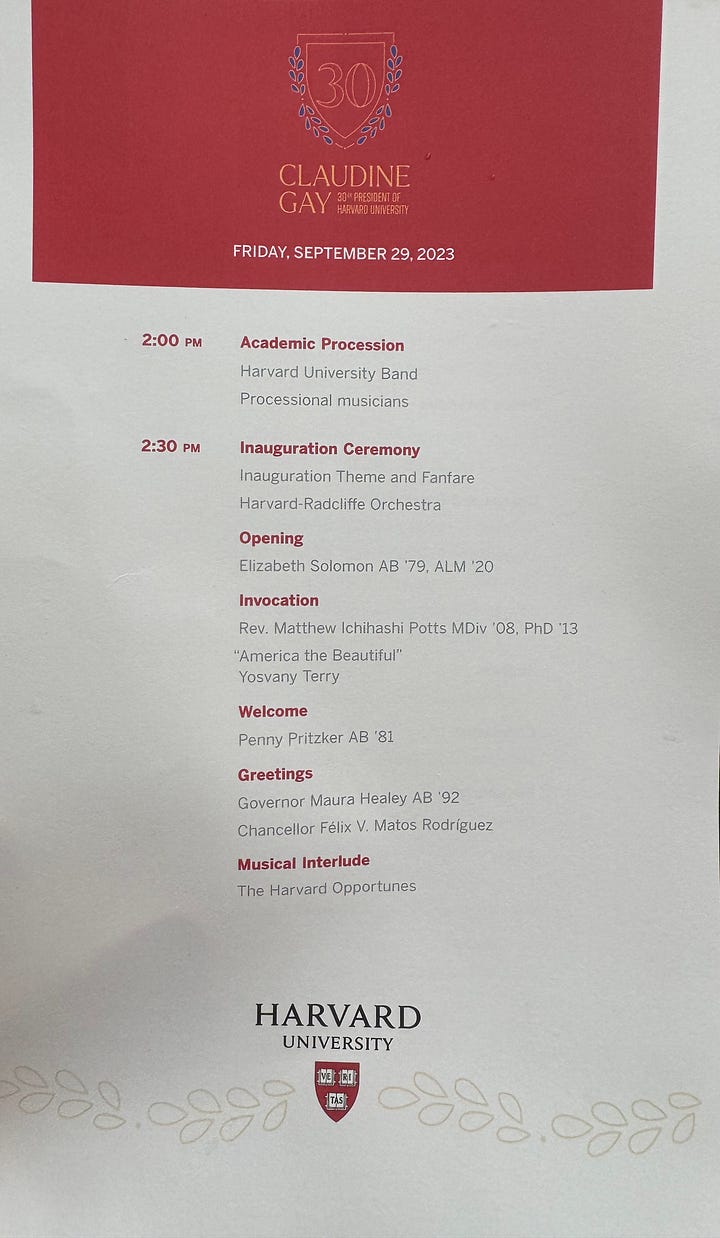
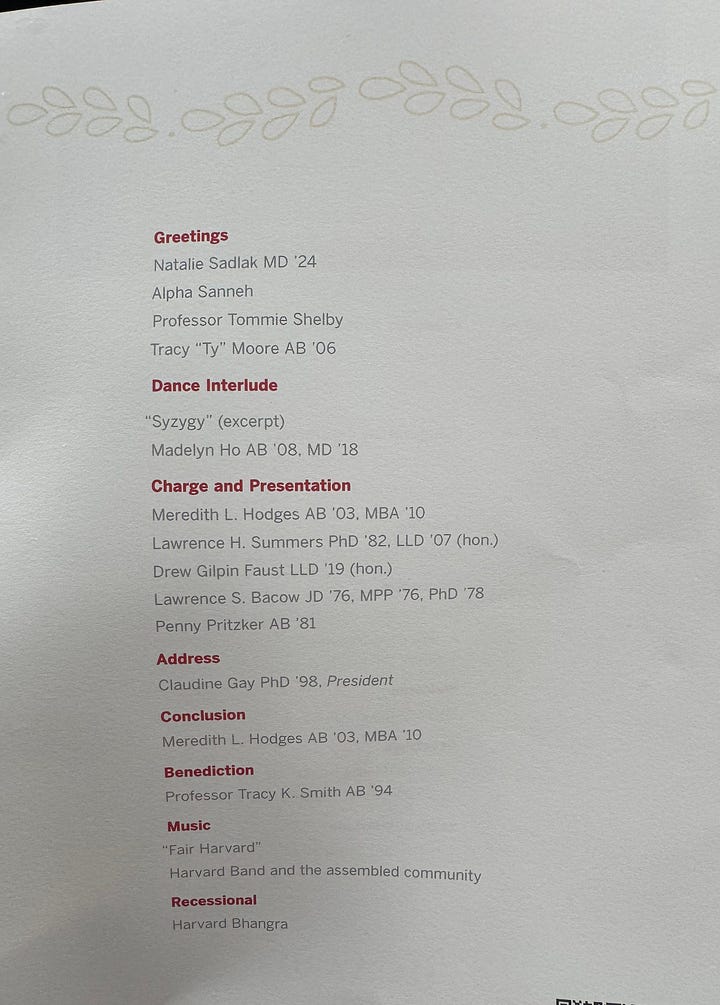
Harvard Yard was filled to capacity. We even got a little pin to commemorate the occasion.
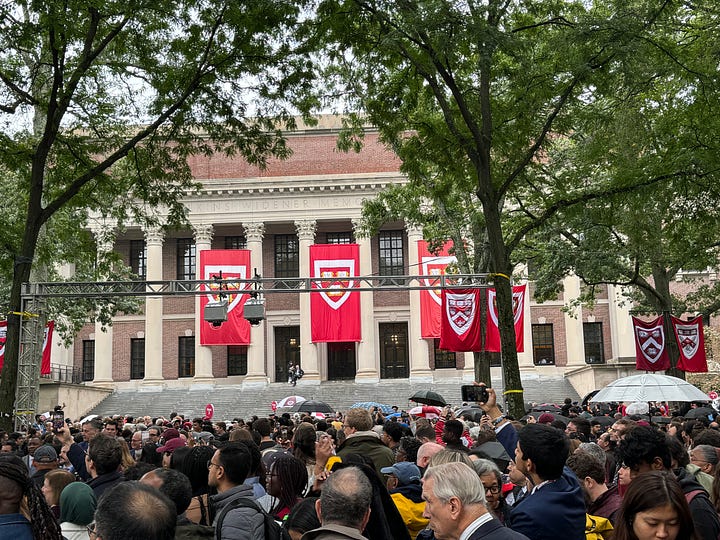
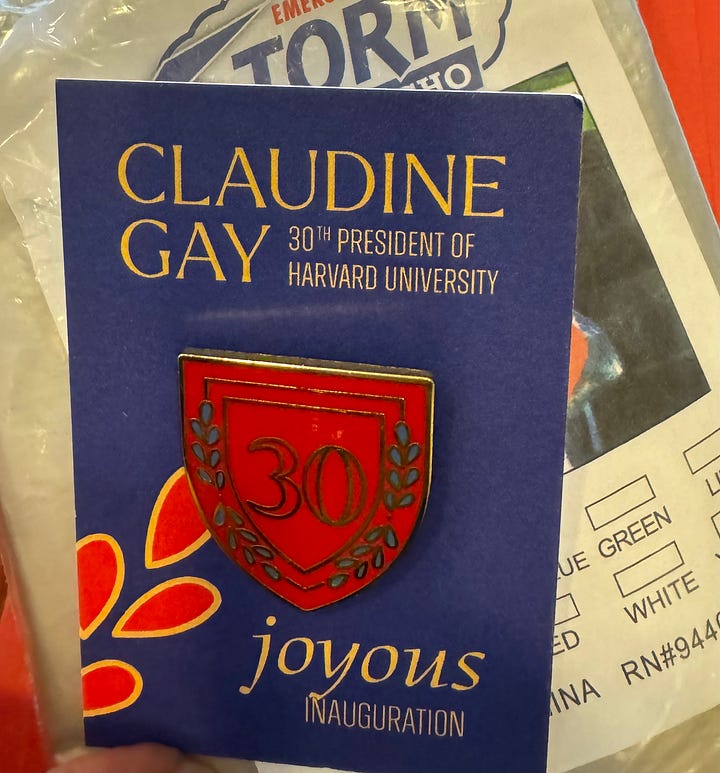
Okay, now that I’ve celebrated, it’s time for me to put on my historian’s cap. Y’all knew I would.
It’s really impossible to discuss the significance of this moment without beginning with the history of ivy league universities and slavery. If you’ve listened to her speech via the link above, even Gay recognized this.
I first began to learn about the legacy of Ivy League universities and slavery back in 2006 when Brown University issued a stunning report on their legacy of profiting from slavery. They were the first Ivy League to do so.
It’s worth nothing that the Steering Committee that issued this report was ordered by then President Ruth J. Simmons, who was the first African American woman president of an Ivy League University. (Interestingly, Simmons had been under consideration to become President of Harvard in 2006, but they chose Drew Gilpin Faust instead.)
Here is an interview with Simmons on her motivations for creating this committee and watershed moment.
Scholars were on it and wasted no time digging more deeply into this history. In 2013 Craig Wilder’s Ebony & Ivy (the NYT review of Wilder’s book provides some interesting context to his research) caught my eye and I picked up a copy. Wilder discovered that slavery had built campus buildings, paid professors, and enslaved human beings had even waited on faculty and students.
And there was more.
One of the more fascinating stories uncovered by Princeton University’s Princeton & Slavery Project was the story of the Princeton Fugitive Slave James Collins Johnson, who was working as a janitor in one of the dormitories in 1843 when a student reported him as a “fugitive slave.”
Yale University didn’t establish a working group to investigate its historic ties to racism and slavery until 2020. According to this report published in 2006, the majority of Yale’s residential colleges are named after enslavers or slavery sympathizers, even though they were named between the 1930s and 1960s. (Yale has been taking steps to begin renaming a few of the colleges, though they face a fundamental conundrum with their namesake Elihu Yale).
Other reports include Columbia University’s Research & Justice Initiative and University of Pennsylvania’s Penn & Slavery Project (which includes a fascinating augmented reality app).
Dartmouth took a more “decentralized” approach and did not release a major report though they have several initiatives across campus to investigate their history. Hmm. I’ll have to learn more about why they chose that path.
By the way, Cornell University is the only Ivy League university with no known connections to slavery. It was founded by Ezra Cornell, a birthright Quaker, in 1865, the same year slavery was abolished.
Okay, I see you Cornell.
In 2019, then-President Lawrence Bacow ordered the report for Harvard and released it in 2022. In his address to the community, Bacow writes: “As the committee’s report powerfully documents, Harvard’s history includes extensive entanglements with slavery.”
I had to blink for a moment when I read this. I wasn’t exactly surprised, but it was still stunning to see the acknowledgement so plainly and publicly.
As Ivy Leagues not only acknowledge the historical entanglement of their universities with the American slave trade, they must also determine what responsibilities they owe in the present, especially given their considerable endowments. For instance, Harvard has established a $100 million restitution fund.
Is that number high enough? Of course, it’s a lot of money and far more than any other university, but Harvard’s endowment is over $50 billion. I’ll be curious to see how the money is used.
During my visit to campus this weekend, a current student mentioned Divest Harvard, a student-led organization that was able to successfully push the university to divest from fossil fuels. Now the group is moving forward with other initiatives, such as climate and endowment justice. I believe in the power of students to push universities to do better. So many powerful movements come from the ground.
But it takes leadership at the top to listen and act. Ruth J. Simmons listened to the Brown University community. I’m so hopeful that Claudine Gay will listen, too.
P.S. I want to plug my friend Rachel Swarns’ new book The 272. The title refers to the 272 human beings who were sold by Jesuits to fund Georgetown University. See this article by Swarns, who is a NYT journalist. I highly urge you to read it! She’s a meticulous researcher.






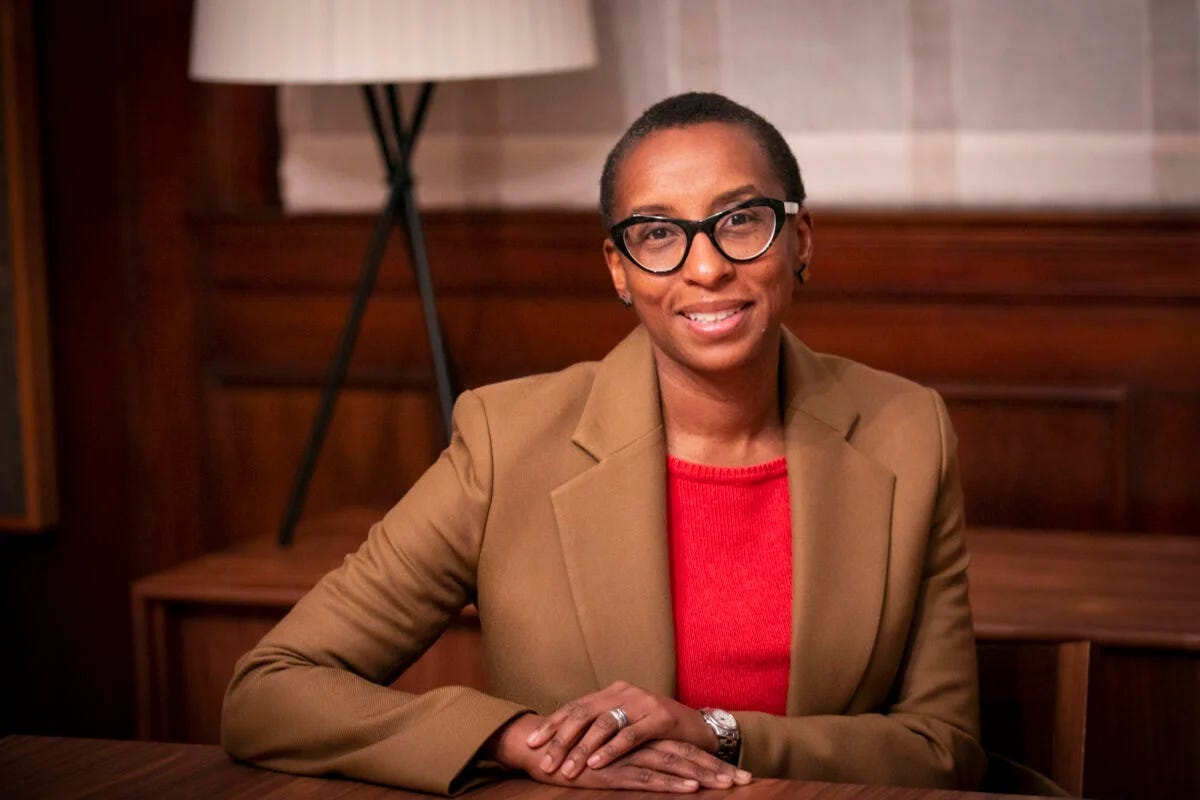
Dolen, this is such a great post. Thanks!
I have to admit, Dr. Gay's installation as president — and the significance — didn't even hit my radar until those terrible congressional hearings. I appreciate having this added perspective. It has to be a tremendously difficult time on campuses everywhere.